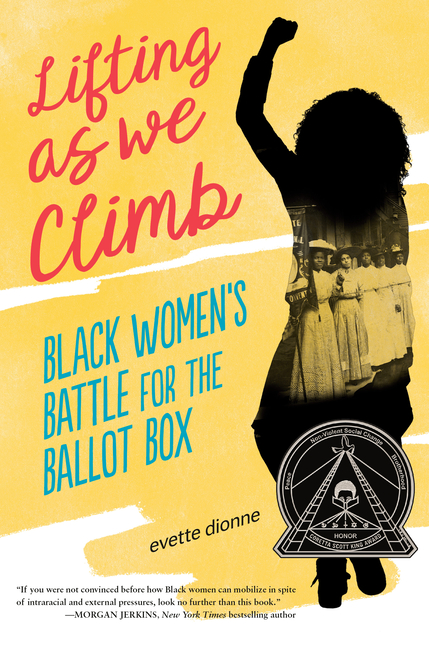Book Descriptions
for Lifting as We Climb by Evette Dionne
From Cooperative Children's Book Center (CCBC)
Reading this illuminating history of the women's suffrage movement in the United States underscores how often the perspective and participation of African American women is missing from other accounts. Beginning with the history of enslavement and its impact on voting/voting rights in general in the United States, this work goes on to document the initial ties and tensions between the abolition and voting movements in the wake of emancipation (were votes for Black men or white women more critical?) and the racism that Black women faced in the women's suffrage movement. As it chronicles Black women's struggle and work for voting rights across the abolition, women's suffrage, and civil rights movements, many sidebars introduce African American women who played critical roles in these efforts. Despite disappointing design elements (matte pages, sometimes grainy black-and-white photos, sidebar placement and font choice) the insightful content of this work is essential. A lengthy bibliography, source notes, and index conclude the volume. (Age 12 and older)
CCBC Choices 2021. © Cooperative Children's Book Center, Univ. of Wisconsin - Madison, 2021. Used with permission.
From the Publisher
For African American women, the fight for the right to vote was only one battle.
This Coretta Scott King Author Honor book tells the important, overlooked story of black women as a force in the suffrage movement--when fellow suffragists did not accept them as equal partners in the struggle.
Susan B. Anthony. Elizabeth Cady Stanton. Alice Paul. The Women's Rights Convention at Seneca Falls. The 1913 Women's March in D.C. When the epic story of the suffrage movement in the United States is told, the most familiar leaders, speakers at meetings, and participants in marches written about or pictured are generally white.
That's not the real story.
Women of color, especially African American women, were fighting for their right to vote and to be treated as full, equal citizens of the United States. Their battlefront wasn't just about gender. African American women had to deal with white abolitionist-suffragists who drew the line at sharing power with their black sisters. They had to overcome deep, exclusionary racial prejudices that were rife in the American suffrage movement. And they had to maintain their dignity--and safety--in a society that tried to keep them in its bottom ranks.
Lifting as We Climb is the empowering story of African American women who refused to accept all this. Women in black church groups, black female sororities, black women's improvement societies and social clubs. Women who formed their own black suffrage associations when white-dominated national suffrage groups rejected them. Women like Mary Church Terrell, a founder of the National Association of Colored Women and of the NAACP; or educator-activist Anna Julia Cooper who championed women getting the vote and a college education; or the crusading journalist Ida B. Wells, a leader in both the suffrage and anti-lynching movements.
Author Evette Dionne, a feminist culture writer and the editor-in-chief of Bitch Media, has uncovered an extraordinary and underrepresented history of black women. In her powerful book, she draws an important historical line from abolition to suffrage to civil rights to contemporary young activists--filling in the blanks of the American suffrage story.
"Dionne provides a detailed and comprehensive look at the overlooked roles African American women played in the efforts to end slavery and then to secure the right to vote for women." --Kirkus Reviews, starred review
This Coretta Scott King Author Honor book tells the important, overlooked story of black women as a force in the suffrage movement--when fellow suffragists did not accept them as equal partners in the struggle.
Susan B. Anthony. Elizabeth Cady Stanton. Alice Paul. The Women's Rights Convention at Seneca Falls. The 1913 Women's March in D.C. When the epic story of the suffrage movement in the United States is told, the most familiar leaders, speakers at meetings, and participants in marches written about or pictured are generally white.
That's not the real story.
Women of color, especially African American women, were fighting for their right to vote and to be treated as full, equal citizens of the United States. Their battlefront wasn't just about gender. African American women had to deal with white abolitionist-suffragists who drew the line at sharing power with their black sisters. They had to overcome deep, exclusionary racial prejudices that were rife in the American suffrage movement. And they had to maintain their dignity--and safety--in a society that tried to keep them in its bottom ranks.
Lifting as We Climb is the empowering story of African American women who refused to accept all this. Women in black church groups, black female sororities, black women's improvement societies and social clubs. Women who formed their own black suffrage associations when white-dominated national suffrage groups rejected them. Women like Mary Church Terrell, a founder of the National Association of Colored Women and of the NAACP; or educator-activist Anna Julia Cooper who championed women getting the vote and a college education; or the crusading journalist Ida B. Wells, a leader in both the suffrage and anti-lynching movements.
Author Evette Dionne, a feminist culture writer and the editor-in-chief of Bitch Media, has uncovered an extraordinary and underrepresented history of black women. In her powerful book, she draws an important historical line from abolition to suffrage to civil rights to contemporary young activists--filling in the blanks of the American suffrage story.
"Dionne provides a detailed and comprehensive look at the overlooked roles African American women played in the efforts to end slavery and then to secure the right to vote for women." --Kirkus Reviews, starred review
Publisher description retrieved from Google Books.


